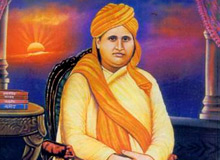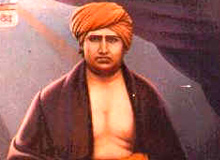Born: 12, February, 1824
Died: 31, October, 1883
Achievements
 Dayanand
Saraswati was a reformer and believed in pragmatism. He preached
against many rituals of the Hindu religion such as idol-worship, caste
by birth, animal sacrifices and restrictions of women from reading
Vedas. He was not only a great scholar and philosopher but also a social
reformer and a political thinker. Dayanand Saraswati was responsible
for the revival of the Indian educational system by bringing together
pupil from different strata of the society under one umbrella, that is,
classroom.
Dayanand
Saraswati was a reformer and believed in pragmatism. He preached
against many rituals of the Hindu religion such as idol-worship, caste
by birth, animal sacrifices and restrictions of women from reading
Vedas. He was not only a great scholar and philosopher but also a social
reformer and a political thinker. Dayanand Saraswati was responsible
for the revival of the Indian educational system by bringing together
pupil from different strata of the society under one umbrella, that is,
classroom.
Early Life
Dayanand Saraswati was born on 12, February, 1824 in Tankara, Gujarat. His original name was Mool Shankar. His father Karsanji was a tax collector and was a rich, prosperous and influential person. He was the head of an eminent Brahmin family of the village. When Mool Shankar was eight years old, Yajnopavita Sanskara, or the investiture with thread of the "twice-born" were performed. His father was a follower of Shiva and taught Dayanand Saraswati the ways to impress the Lord. Dayanand was also told the importance of keeping fasts. On the occasion of Shivaratri, Dayanand had to sit awake the whole night in obedience to Lord Shiva. One such night, he saw a mouse eating the offerings to the God and running over the idol's body. After seeing this, he questioned himself, if the God could not defend himself against a little mouse then how could he be the savior of the massive world.
When Dayanand was fourteen years old, his sister died. He was so shocked by the sudden demise of his sister that he began to look upon death as a challenge. He also ran away from home to know the secret of death. In search of the answer, Dayanand wandered all over the country for around twenty years. During his course, Dayanand visited temples and sacred places of religious devotion. He met Yogis living in the mountains and forests but nobody had the perfect answer Dayanand was seeking for.
Lastly, Dayanand Saraswati went to Mathura where he found Swami Vrijananda and became his disciple. Vrijananda asked Dayanand to throw away all his books and learn directly from the Vedas. After completing his Vedic-education, Dayanand realized that his purpose of learning the "secret of death" has been satisfied. On the day Dayanand was to leave from the ashram, Swami Vrijananda called him and asked to spread the knowledge of Vedas in the society. The name Rishi Dayanand was also given by his guru Swami Vrijananda.
Arya Samaj
On 7 April, 1875 Dayanand Saraswati formed the Arya Samaj at Bombay. It was a Hindu reforms movement, meaning "society of the nobles". The purpose of the samaj was to move the Hindu religion away from the fictitious beliefs. 'Krinvanto Vishvam Aryam" was the motto of the samaj, which means, "Make this world noble". Today, the Arya Samaj organization is very active not only in India but also in various parts of the world. The United States, Canada, Trinidad, Mexico, United Kingdom, Netherlands, Kenya, Tanzania, Uganda, South Africa, Malawi, Mauritius, Pakistan, Burma, Thailand, Singapore, Hong Kong, and Australia are some of the countries where the Samaj has its branches.
 The 10 principles of Arya Samaj
The 10 principles of Arya Samaj
Died: 31, October, 1883
Achievements
 Dayanand
Saraswati was a reformer and believed in pragmatism. He preached
against many rituals of the Hindu religion such as idol-worship, caste
by birth, animal sacrifices and restrictions of women from reading
Vedas. He was not only a great scholar and philosopher but also a social
reformer and a political thinker. Dayanand Saraswati was responsible
for the revival of the Indian educational system by bringing together
pupil from different strata of the society under one umbrella, that is,
classroom.
Dayanand
Saraswati was a reformer and believed in pragmatism. He preached
against many rituals of the Hindu religion such as idol-worship, caste
by birth, animal sacrifices and restrictions of women from reading
Vedas. He was not only a great scholar and philosopher but also a social
reformer and a political thinker. Dayanand Saraswati was responsible
for the revival of the Indian educational system by bringing together
pupil from different strata of the society under one umbrella, that is,
classroom.Early Life
Dayanand Saraswati was born on 12, February, 1824 in Tankara, Gujarat. His original name was Mool Shankar. His father Karsanji was a tax collector and was a rich, prosperous and influential person. He was the head of an eminent Brahmin family of the village. When Mool Shankar was eight years old, Yajnopavita Sanskara, or the investiture with thread of the "twice-born" were performed. His father was a follower of Shiva and taught Dayanand Saraswati the ways to impress the Lord. Dayanand was also told the importance of keeping fasts. On the occasion of Shivaratri, Dayanand had to sit awake the whole night in obedience to Lord Shiva. One such night, he saw a mouse eating the offerings to the God and running over the idol's body. After seeing this, he questioned himself, if the God could not defend himself against a little mouse then how could he be the savior of the massive world.
When Dayanand was fourteen years old, his sister died. He was so shocked by the sudden demise of his sister that he began to look upon death as a challenge. He also ran away from home to know the secret of death. In search of the answer, Dayanand wandered all over the country for around twenty years. During his course, Dayanand visited temples and sacred places of religious devotion. He met Yogis living in the mountains and forests but nobody had the perfect answer Dayanand was seeking for.
Lastly, Dayanand Saraswati went to Mathura where he found Swami Vrijananda and became his disciple. Vrijananda asked Dayanand to throw away all his books and learn directly from the Vedas. After completing his Vedic-education, Dayanand realized that his purpose of learning the "secret of death" has been satisfied. On the day Dayanand was to leave from the ashram, Swami Vrijananda called him and asked to spread the knowledge of Vedas in the society. The name Rishi Dayanand was also given by his guru Swami Vrijananda.
Arya Samaj
On 7 April, 1875 Dayanand Saraswati formed the Arya Samaj at Bombay. It was a Hindu reforms movement, meaning "society of the nobles". The purpose of the samaj was to move the Hindu religion away from the fictitious beliefs. 'Krinvanto Vishvam Aryam" was the motto of the samaj, which means, "Make this world noble". Today, the Arya Samaj organization is very active not only in India but also in various parts of the world. The United States, Canada, Trinidad, Mexico, United Kingdom, Netherlands, Kenya, Tanzania, Uganda, South Africa, Malawi, Mauritius, Pakistan, Burma, Thailand, Singapore, Hong Kong, and Australia are some of the countries where the Samaj has its branches.
 The 10 principles of Arya Samaj
The 10 principles of Arya Samaj- God is the efficient cause of all true knowledge and all that is known through knowledge.
- God is existent, intelligent and blissful. He is formless, omniscient, just, merciful, unborn, endless, unchangeable, beginning-less, unequalled, the support of all, the master of all, omnipresent, immanent, un-aging, immortal, fearless, eternal and holy, and the maker of all. He alone is worthy of being worshiped.
- The Vedas are the scriptures of all true knowledge. It is the paramount duty of all Aryas to read them, teach them , recite them and to hear them being read.
- One should always be ready to accept truth and to renounce untruth.
- All acts should be performed in accordance with Dharma that is, after deliberating what is right and wrong.
- The prime object of the Arya Samaj is to do good to the world, that is, to promote physical, spiritual and social good of everyone.
- Our conduct towards all should be guided by love, righteousness and justice.
- We should dispel Avidya (ignorance) and promote Vidya (knowledge).
- No one should be content with promoting his/her good only; on the contrary, one should look for his/her good in promoting the good of all.
- One should regard oneself under restriction to follow the rules of society calculated to promote the well being of all, while in following the rules of individual welfare all should be free.
Death of a saint
Due to his radical thinking and approach to the social issues and beliefs Dayanand Saraswati had created many enemies around him. One such enemy of the saint was the Maharaja of Jodhpur. On the occasion of Diwali, the King invited Dayanand Saraswati to Jodhpur and killed him by offering food mixed with poison, in 1883. The king was believed to be against the principles of Dayanand Saraswati.
Due to his radical thinking and approach to the social issues and beliefs Dayanand Saraswati had created many enemies around him. One such enemy of the saint was the Maharaja of Jodhpur. On the occasion of Diwali, the King invited Dayanand Saraswati to Jodhpur and killed him by offering food mixed with poison, in 1883. The king was believed to be against the principles of Dayanand Saraswati.
